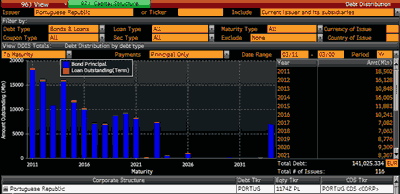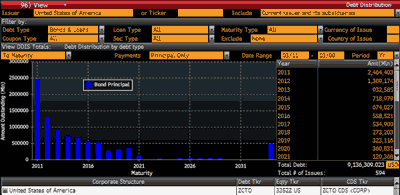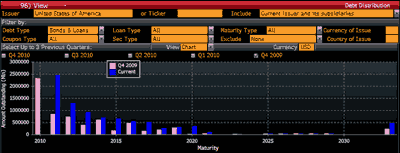Everyone knew that Portugal would have to roll over and accept a bailout at some point. It was inevitable that this has happened. The lines crossed some time ago. Portugal has too much short-term debt. The cost of rolling it over (if possible at all) would be too high. Debt service at free market rates would kill the country. So there is no sense in keeping up the charade any longer. It was Portugal’s dependence on ST debt that did them in. This chart shows how the maturity schedule of existing debt simply overwhelmed their capacity to refinance.
(click to enlarge)
What would you call this? ‘Mismanagement’ comes to mind. The Portuguese Treasury put the country at risk. Rather than point fingers it would be ‘nicer’ to conclude that Portugal had no option but to borrow short-term. It would be fair to blame the economic leaders of the EU. They knew for years that Portugal’s ST debt was a time bomb. The lessons of Greece and Ireland and their dependence on money with a short string are fresh in their minds.
Okay. You got that? ST debt = death. The greater the reliance on ST financing the greater the systemic risk. Now look at the US debt profile. Compare it to Portugal. Who looks worse to you?
(click to enlarge)
When looking at a country’s aggregate debt and maturity profile it is important to look at the borrower’s current status. But it is much more important to look at the relative change of ST debt on a year over year basis. Clearly the US is going in the wrong direction. It’s happening at a pretty good clip.
(click to enlarge)
The argument that will be put to me is that the USA is a Reserve Currency and therefore can never be faced with the Portuguese disease of “no rollover”. Hogwash. Like I said, “Mismanagement” comes to mind.
Disclaimer: This page contains affiliate links. If you choose to make a purchase after clicking a link, we may receive a commission at no additional cost to you. Thank you for your support!







Leave a Reply